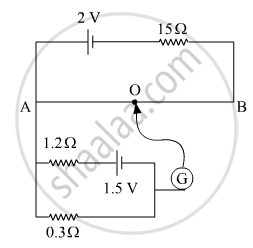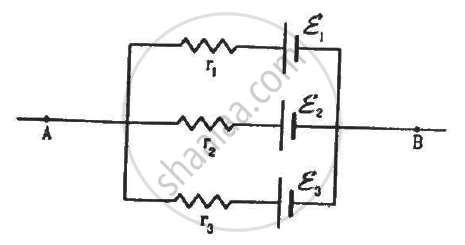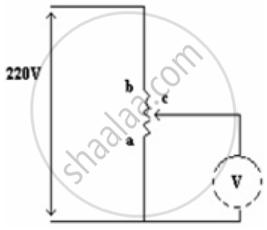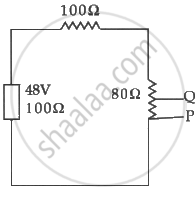Advertisements
Advertisements
प्रश्न
Why is potentiometer preferred over a voltmeter for comparison of emf. of cells?
उत्तर
Potentiometer is preferred over a voltmeter for comparison of emf of cells because of the following reasons:
(a) A potentiometer can measure the internal resistance of the cell, which a voltmeter cannot measure.
(b) A potentiometer can accurately measure small potential differences, which a voltmeter cannot.
(c) The accuracy of a potentiometer can also be increased by increasing the length of the wire, whereas the accuracy of the voltmeter is fixed.
APPEARS IN
संबंधित प्रश्न
In the following potentiometer circuit, AB is a uniform wire of length 1 m and resistance 10 Ω. Calculate the potential gradient along the wire and balance length AO (= l).

In a series LCR circuit, what is the phase difference between VL and VC where VL is the potential difference across the inductor and V c is the potential difference across the capacitor?
The emf of a cell is always greater than its terminal voltage. Why? Give reason.
The current in a conductor and the potential difference across its ends are measured by an ammeter and a voltmeter. The meters draw negligible currents. The ammeter is accurate but the voltmeter has a zero error (that is, it does not read zero when no potential difference is applied). Calculate the zero error if the readings for two different conditions are 1.75 A, 14.4 V and 2.75 A, 22.4 V.
In the circuit shown in the figure, ε1 = 3 V, ε2 = 2 V, εa = 1 V and r1 = r2 = r3 = 1Ω. Find the potential difference between the points A and B and the current through each branch.

A potential difference of 220 V is maintained across 12000 Ω rheostat. Then voltmeter V has a resistance of 6000 Ω and point C is at one fourth the distance from a to b. Then the reading of voltmeter is ______.

In the circuit in figure the potential difference across P and Q will be nearest to

The terminal potential difference of a cell is greater than its e.m.f when it is ______
